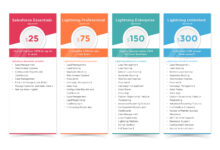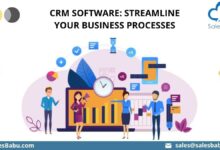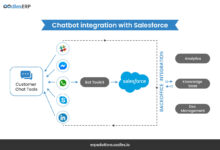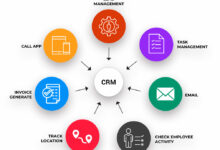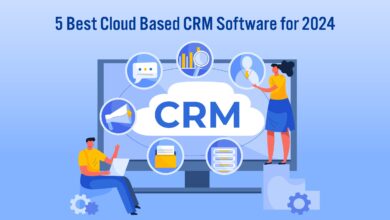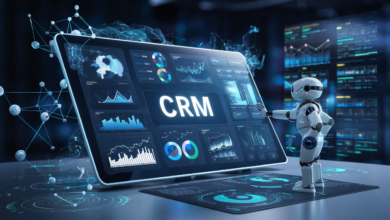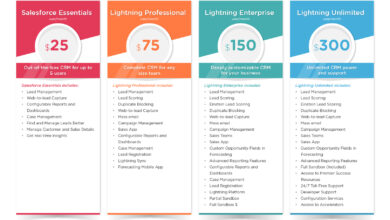AI-Powered CRM Software: Revolutionizing Customer Relationship Management
Starting with AI-Powered CRM Software, this innovative technology is reshaping how businesses manage and interact with their customers, revolutionizing the realm of Customer Relationship Management.
As we delve deeper into the capabilities of AI in CRM systems, a world of personalized insights, streamlined automation, and enhanced efficiency unfolds before us.
Introduction to AI-Powered CRM Software
AI-Powered CRM software is a cutting-edge technology that leverages artificial intelligence to enhance customer relationship management processes. By integrating AI capabilities into CRM systems, businesses can streamline operations, improve customer interactions, and drive revenue growth.
Significance of AI in CRM
AI revolutionizes traditional CRM practices by automating repetitive tasks, analyzing vast amounts of data in real-time, and providing valuable insights to enhance customer experiences. With AI, businesses can personalize interactions, predict customer behavior, and optimize marketing strategies for better results.
Benefits of AI Integration in CRM Systems
- Enhanced Customer Insights: AI algorithms analyze customer data to uncover patterns, preferences, and trends, enabling businesses to tailor their offerings and communication strategies accordingly.
- Improved Efficiency: Automation of routine tasks such as lead scoring, email responses, and data entry frees up valuable time for sales and support teams to focus on high-value activities.
- Increased Sales and Revenue: AI-driven recommendations and predictive analytics help sales teams identify opportunities, prioritize leads, and optimize sales processes to drive revenue growth.
- Better Customer Engagement: AI-powered chatbots and virtual assistants provide instant support, resolve queries, and offer personalized recommendations, leading to higher customer satisfaction and loyalty.
- Real-time Decision Making: AI-powered CRM systems deliver real-time insights and recommendations, empowering businesses to make informed decisions quickly and adapt to changing market dynamics.
Features of AI-Powered CRM Software
AI-Powered CRM software offers a range of advanced features that enhance customer relationship management and streamline business processes. Let’s explore some key features and compare them with traditional CRM software.
Key Features:
- Intelligent Data Entry: AI algorithms can automatically capture and input customer data from various sources, eliminating manual data entry errors.
- Lead Scoring and Prioritization: AI can analyze customer behavior and interactions to score leads based on their likelihood to convert, helping sales teams focus on high-potential prospects.
- Automated Task Management: AI-Powered CRM automates routine tasks such as follow-up emails, scheduling appointments, and updating records, saving time for sales reps.
- Predictive Analytics: AI algorithms analyze historical data to predict future trends, customer behavior, and potential opportunities, enabling proactive decision-making.
- Personalized Recommendations: AI can suggest personalized product recommendations, content, and offers based on individual customer preferences and past interactions.
Comparison with Traditional CRM:
Traditional CRM software relies on manual data entry, basic reporting, and static customer segmentation. In contrast, AI-powered CRM systems leverage machine learning and automation to provide real-time insights, predictive analytics, and personalized recommendations.
Enhanced Customer Data Management:
AI enhances customer data management in CRM systems by continuously analyzing and updating customer profiles with the latest information. For example, AI can identify patterns in customer behavior, predict customer needs, and recommend the best course of action to improve customer satisfaction and retention.
Implementation of AI in CRM Systems
Implementing AI technology in CRM systems involves a strategic process to enhance customer interactions and improve overall efficiency. By leveraging AI capabilities, businesses can gain valuable insights, automate tasks, and personalize customer experiences.
Process of Implementing AI in CRM Systems
- Assess Business Needs: Identify key areas where AI can add value to customer relationship management.
- Data Collection and Cleaning: Gather relevant data from various sources and ensure its accuracy for AI algorithms.
- AI Integration: Select AI tools or platforms that align with CRM objectives and integrate them seamlessly into existing systems.
- Training AI Models: Train AI algorithms to recognize patterns, predict outcomes, and provide actionable insights.
- Testing and Optimization: Conduct thorough testing to validate AI performance and continuously optimize algorithms for better results.
Challenges and Considerations when Integrating AI into CRM Software
- Data Privacy and Security: Ensure compliance with data protection regulations and safeguard customer information.
- User Acceptance: Address concerns about job displacement and demonstrate the benefits of AI adoption to gain employee buy-in.
- Integration Complexity: Overcome technical challenges related to integrating AI with existing CRM infrastructure and workflows.
- Ethical Use of AI: Develop guidelines for ethical AI usage to prevent bias and ensure responsible decision-making.
Best Practices for Successful AI Adoption in CRM Solutions
- Start Small, Scale Gradually: Begin with pilot projects to evaluate AI effectiveness before scaling up implementation.
- Continuous Training and Monitoring: Invest in ongoing training for AI systems and monitor performance to identify opportunities for improvement.
- Collaboration Across Teams: Foster collaboration between IT, sales, marketing, and customer service teams to maximize AI benefits.
- Feedback and Iteration: Gather feedback from users and customers to refine AI algorithms and enhance user experiences over time.
Personalization and Customer Insights
In today’s competitive business landscape, providing personalized customer interactions and gaining valuable insights into customer behavior are crucial for success. AI-Powered CRM software plays a vital role in enabling businesses to achieve this goal.
Personalized Customer Interactions
AI-Powered CRM software leverages artificial intelligence algorithms to analyze vast amounts of customer data in real-time. By understanding customer preferences, purchase history, and behavior patterns, the software can tailor interactions to meet individual needs. For example, AI can recommend personalized product suggestions, send targeted marketing messages, or provide proactive customer service support based on past interactions.
Customer Insights and Predictive Analytics
AI in CRM systems can analyze customer data to provide valuable insights for businesses. By identifying trends, patterns, and correlations within the data, AI can help businesses make informed decisions, optimize marketing strategies, and improve customer satisfaction. For instance, AI can forecast customer behavior, predict future trends, and anticipate customer needs based on historical data analysis.
Examples of AI in Predicting Customer Behavior
- AI can analyze customer interactions across multiple channels to predict the likelihood of churn and take proactive measures to retain customers.
- AI algorithms can segment customers based on their preferences and behaviors to create targeted marketing campaigns that resonate with specific customer segments.
- By analyzing social media data, AI can predict customer sentiment and help businesses tailor their messaging to align with customer preferences.
Automation and Efficiency
AI plays a crucial role in automating various tasks within CRM systems, streamlining processes, and ultimately improving efficiency. By leveraging AI capabilities, CRM professionals can significantly reduce manual workload and focus on more strategic initiatives.
Automating Repetitive Tasks
- AI-powered CRM software can automate repetitive tasks such as data entry, lead scoring, and email responses, saving valuable time for CRM professionals.
- By using machine learning algorithms, AI can analyze customer interactions and behavior to automate follow-up tasks, ensuring timely responses and personalized communication.
Streamlining Processes
- AI streamlines processes in CRM systems by identifying patterns and trends in customer data, enabling predictive analytics for more informed decision-making.
- Through automation, AI can streamline sales workflows, prioritize leads, and recommend the best communication channels for engaging with customers efficiently.
Reducing Manual Workload
- AI reduces the manual workload for CRM professionals by handling routine tasks, freeing up time for them to focus on building relationships and providing personalized customer experiences.
- Automating manual processes with AI not only improves efficiency but also minimizes errors and ensures consistency in customer interactions across all touchpoints.
Integration with Other Technologies
AI-Powered CRM software can seamlessly integrate with existing technologies to enhance overall efficiency and effectiveness. This integration allows businesses to leverage the power of AI in conjunction with other tools like marketing automation and analytics platforms.
Complementing Marketing Automation
AI complements marketing automation by providing valuable insights into customer behavior and preferences. By analyzing data collected from CRM systems, AI can help automate personalized marketing campaigns, leading to higher engagement and conversion rates.
Enhancing Analytics Platforms
Integrating AI with analytics platforms enables businesses to gain deeper insights into customer trends and patterns. AI can analyze large datasets quickly and accurately, providing actionable intelligence for better decision-making and predictive analytics.
Advantages of Seamless Integration
– Improved Efficiency: Integration between AI and CRM systems streamlines processes, reducing manual tasks and improving overall productivity.
– Enhanced Personalization: By combining AI capabilities with CRM data, businesses can deliver personalized experiences to customers, fostering stronger relationships and loyalty.
– Data-driven Decisions: The seamless integration of AI and CRM systems ensures that businesses have access to real-time data and insights, enabling informed decision-making and strategic planning.
Data Security and Privacy
In the realm of AI-Powered CRM systems, data security and privacy are paramount considerations. The sensitive information stored within CRM software must be safeguarded to maintain the trust of customers and comply with regulations.
Measures for Data Protection
- Encryption: Data is encrypted both in transit and at rest to prevent unauthorized access.
- Access Control: Role-based access controls limit who can view, edit, or delete data within the CRM system.
- Regular Audits: Periodic audits are conducted to ensure compliance with data protection policies and regulations.
- Data Masking: Sensitive information is masked to ensure that only authorized personnel can view full details.
Compliance Regulations
- GDPR: The General Data Protection Regulation sets standards for data protection and privacy for individuals within the European Union.
- CCPA: The California Consumer Privacy Act grants consumers more control over the personal information that businesses collect about them.
- HIPAA: The Health Insurance Portability and Accountability Act establishes standards to protect sensitive patient health information.
- AI Ethics Guidelines: Organizations are encouraged to follow ethical guidelines when using AI to ensure fairness and transparency in data processing.
Scalability and Flexibility
AI-Powered CRM software offers a range of scalability options to support the growth of businesses. The integration of AI enhances the flexibility of CRM systems, allowing them to adapt to changing business needs seamlessly. Let’s delve deeper into how AI enables customization and scalability in CRM solutions.
Customization through AI
AI algorithms can analyze customer data and behavior patterns to segment customers effectively. This segmentation enables businesses to tailor their marketing strategies and communication channels based on specific customer preferences and needs. For example, AI can identify high-value customers and personalize interactions to enhance customer satisfaction and loyalty.
Scalability Features
- Dynamic Scaling: AI-Powered CRM systems can dynamically scale resources based on the volume of data and transactions, ensuring optimal performance during peak times.
- Automated Workflows: AI automates repetitive tasks, allowing businesses to handle a growing customer base without increasing manual effort.
- Predictive Analytics: AI algorithms can predict future trends and customer behavior, assisting businesses in making informed decisions to support scalability.
Future Trends in AI-Powered CRM
Artificial Intelligence (AI) continues to revolutionize Customer Relationship Management (CRM) software, shaping the future of how businesses interact with customers. As technology advances, new trends are emerging that further enhance AI capabilities within CRM systems.
Enhanced Predictive Analytics
Predictive analytics powered by AI is set to become more sophisticated, enabling businesses to anticipate customer needs and behavior with greater accuracy. By analyzing vast amounts of data, AI can provide valuable insights into customer preferences, allowing companies to tailor their offerings effectively.
- AI-driven predictive analytics will enable businesses to forecast customer behavior and trends more accurately.
- By leveraging AI algorithms, companies can personalize marketing campaigns and product recommendations based on individual customer data.
- Enhanced predictive analytics will help businesses optimize their sales processes and improve customer retention rates.
Integration of Voice Assistants
The integration of voice assistants, such as virtual chatbots and smart speakers, is expected to become more prevalent in AI-powered CRM systems. Voice technology offers a convenient and efficient way for customers to interact with businesses, providing instant responses to queries and enhancing overall customer experience.
- Voice assistants powered by AI will streamline customer interactions, offering real-time support and personalized assistance.
- Businesses can leverage voice technology to automate routine tasks, such as appointment scheduling and order processing, improving operational efficiency.
- The integration of voice assistants will enable businesses to deliver seamless omnichannel experiences, enhancing customer engagement across multiple touchpoints.
AI-Driven Hyper-Personalization
Hyper-personalization, driven by AI algorithms, is set to redefine customer engagement strategies in CRM systems. By analyzing customer behavior and preferences in real-time, AI can deliver highly tailored experiences that resonate with individual customers on a deeper level.
- AI-powered hyper-personalization will enable businesses to create targeted marketing campaigns that resonate with specific customer segments.
- By leveraging AI insights, companies can deliver personalized product recommendations and content to enhance customer satisfaction and loyalty.
- Hyper-personalization will help businesses build stronger relationships with customers by anticipating their needs and preferences proactively.
Ending Remarks
In conclusion, AI-Powered CRM Software is not just a tool but a strategic asset that propels businesses towards a future of seamless customer interactions, data-driven decision-making, and sustainable growth.
